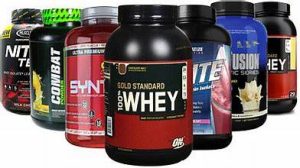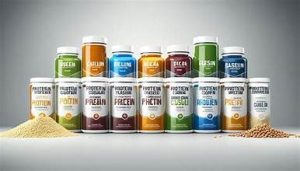Uncategorized
The Science Behind Protein Supplements: Do You Need Them?
The Science Behind Protein Supplements: Do You Need Them?
Protein supplements have become a staple for athletes, fitness enthusiasts, and even those looking to maintain a balanced diet. But are these supplements necessary for everyone, or can you meet your protein needs through food alone? In this article, we’ll delve into the science behind protein supplements and help you determine if they’re right for you.
What Are Protein Supplements?
Protein supplements are products designed to provide an additional source of protein, often in the form of powders, bars, or ready-to-drink shakes. The most common types include:
- Whey protein: Derived from milk, it’s a complete protein with all nine essential amino acids.
- Casein protein: Another milk-derived protein, digested more slowly than whey.
- Plant-based proteins: Sourced from peas, rice, soy, or hemp, these are ideal for vegetarians, vegans, or those with dairy allergies.
- Collagen protein: Supports skin, joint, and connective tissue health.
These supplements are marketed as convenient ways to boost protein intake, especially for those with higher requirements.
Why Is Protein Important?
Protein is an essential macronutrient that plays a vital role in numerous bodily functions:
- Muscle repair and growth: Protein helps repair damaged muscle fibers and promotes growth, especially after exercise.
- Enzyme production: Proteins are involved in chemical reactions necessary for digestion, energy production, and other metabolic processes.
- Immune support: Many components of the immune system, like antibodies, are made of protein.
- Hormonal balance: Proteins contribute to the production of hormones like insulin and growth hormones.
Without adequate protein, your body can’t function optimally, which is why meeting daily protein requirements is crucial.

How Much Protein Do You Really Need?
The Recommended Dietary Allowance (RDA) for protein is:
- 0.8 grams per kilogram of body weight for the average adult.
- 1.2-2.0 grams per kilogram for active individuals, athletes, or those aiming to build muscle.
For example, a sedentary individual weighing 70 kg (154 lbs) would need about 56 grams of protein per day. In contrast, an active person of the same weight might require 84-140 grams.
While whole foods like chicken, fish, eggs, legumes, and tofu can provide sufficient protein, some individuals may find it challenging to meet their needs through food alone.
Who Benefits Most From Protein Supplements?
Protein supplements aren’t essential for everyone but can be particularly useful for:
- Athletes and fitness enthusiasts
- Supports muscle recovery and growth after intense workouts.
- Convenient for post-exercise consumption when whole food options aren’t available.
- Busy individuals
- Provides a quick and easy source of protein for those with hectic schedules.
- Vegetarians and vegans
- Helps bridge the protein gap in plant-based diets, which may lack certain amino acids.
- Older adults
- Counteracts age-related muscle loss (sarcopenia) by promoting muscle maintenance.
- Weight management
- High-protein diets can reduce hunger and support fat loss while preserving muscle.
The Science Behind Protein Supplement Effectiveness
Several studies have explored the benefits of protein supplementation:
- Muscle growth and repair: A study published in the Journal of the International Society of Sports Nutrition found that protein supplements significantly enhance muscle protein synthesis when consumed after resistance training.
- Weight loss: Research in the American Journal of Clinical Nutrition shows that higher protein intake can promote satiety and reduce overall calorie consumption.
- Performance improvement: Athletes who supplement with protein report improved recovery times and better performance outcomes.
However, these benefits are most evident in individuals who struggle to meet their protein needs through diet alone.
Can You Rely on Whole Foods Instead?
Whole foods are the best source of protein because they provide additional nutrients like vitamins, minerals, and fiber. For example:
- Chicken breast: A 3-ounce serving contains 26 grams of protein, along with essential B vitamins.
- Lentils: One cup provides 18 grams of protein and is rich in iron and fiber.
- Eggs: One large egg contains 6 grams of high-quality protein plus healthy fats.
However, whole foods may not always be practical for individuals with time constraints, dietary restrictions, or higher protein demands.

Are Protein Supplements Safe?
Protein supplements are generally safe for most people when consumed in moderation. However, excessive intake can lead to:
- Digestive issues: Symptoms like bloating or diarrhea, particularly with lactose-containing whey products.
- Kidney strain: High protein intake may exacerbate existing kidney conditions, although it’s not harmful to healthy kidneys.
- Calorie surplus: Overuse of protein supplements can lead to weight gain if not balanced with overall calorie intake.
To minimize risks:
- Choose high-quality supplements free from unnecessary additives.
- Stick to the recommended serving size.
- Balance your intake with whole food sources.
Tips for Choosing the Right Protein Supplement
If you decide to incorporate protein supplements into your diet, consider the following:
- Identify your goals: Whether it’s muscle gain, weight loss, or general health, select a supplement tailored to your needs.
- Check for allergens: Opt for plant-based options if you’re lactose intolerant or allergic to dairy.
- Read the label: Avoid products with excessive sugar, artificial flavors, or unverified claims.
- Compare types:
- Whey protein: Best for quick absorption post-workout.
- Casein: Ideal for nighttime use due to slow digestion.
- Plant-based: Suitable for vegetarians and those with sensitivities.
Do You Need Protein Supplements?
Ultimately, the decision to use protein supplements depends on your lifestyle, dietary habits, and health goals.
- Yes, if:
- You struggle to meet protein needs through diet.
- You’re an athlete or highly active individual.
- You have specific health conditions requiring higher protein intake.
- No, if:
- Your diet already provides sufficient protein.
- You prefer whole food sources.
- You don’t have increased protein requirements.
Conclusion
Protein supplements can be a valuable tool for meeting nutritional goals, especially for active individuals, vegetarians, or those with busy lifestyles. However, they’re not a necessity for everyone. By focusing on a balanced diet and understanding your unique needs, you can determine whether protein supplements are right for you.
At PrimeBestPremierMS.com, we offer a curated selection of high-quality protein supplements tailored to your goals. Explore our range today and fuel your journey to optimal health!


